False widow spiders, desperate to escape the plummeting temperatures, will be crawling into people's homes in their thousands
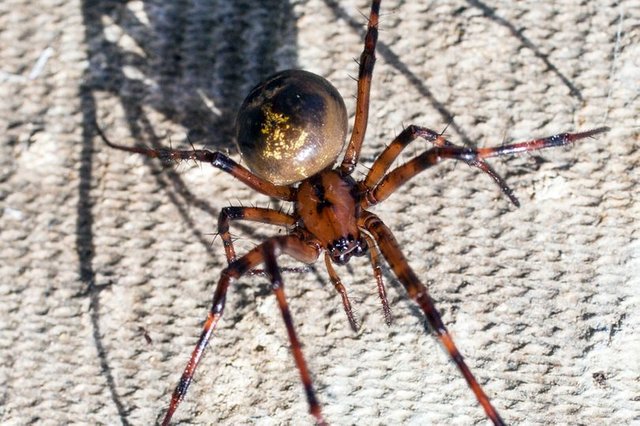
Britain will be invaded by false widow spiders
Brits are being warned their homes could be invaded by an amy of the UK's most venemous spiders during the cold snap.
False widow spiders , desperate to escape the plummeting temperatures, will be crawling into people's homes in their thousands.
The spiders can deliver an agonising bite and the warm and wet conditions this summer provided the perfect breeding ground for them.
One has already managed to make its way into Janeane Williams' home, weaving a huge web by her front window.
The 24-year-old from Kingthorpe, Northampton, is too petrified to go near but took a snatch photo of it.
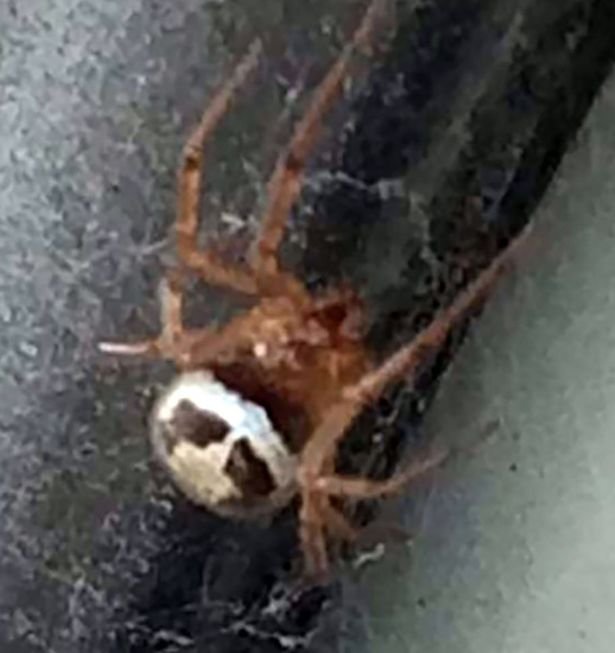
The false widow spider has invaded Janeane's home
Janeane said "I'm normally okay with spiders but I don't want to even get near this one. I just saw this web on the window grow and grow for about a week.
"It was fine by me....spiders are good for keeping flies out the house. But then I actually saw it and I've never seen anything like it.
"I've been waiting to catch a photo of it but it keeps hiding."
False widows are cousins of the deadly black widow spider and are increasing in numbers across the UK.
Their bite can't kill a human but the venom causes painful burns and swelling, and can lead to a fever.
They can be identified by their brownish-reddish bodies with white markings.
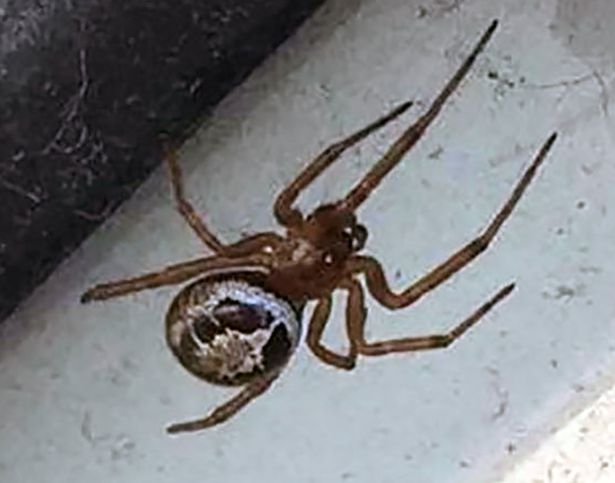
Janeane's home has been invaded by the false widow spiders
Janeane says she has no idea what to do with the creepy-crawly but she doesn't want to kill it so she will try to catch it in a glass and put it outside.
She said "I like to think I'll drive 100 miles away from my house before I let it out."
A spokesman for Northampton-based exterminators Pest Professionals said "This spider is most definitely a false widow.
"There are many types of false widow and all though they look pretty scary they do not pose much of a threat to human beings.
"The species is actually scared of human beings but if cornered they could bite and cause a good deal of pain."
In April mum-of-five Gemma Hunter said she could lose her foot after she was bitten by a false widow spider.
The attack, eight months earlier, left her with a 3cm deep hole fromthe spider's fangs in her right foot, which became infected with cellulitis.
Gemma, 41, of Rossendale, Lancs, said in April her children were calling her 'zombie foot' because of the wound and she has lost her job, was being evicted and was considering amputation to end her ordeal.
She said she walks with a crutch because she cannot bare the pain of putting any pressure on the foot which turned black after the bite became infected.
Gemma claimed the spider came in through an open window and bit her as she dozed at the bedside of her 16-year-old son, who was poorly and was in hospital.
"I woke up at 3.45am, I had seen the spider before but didn't think anything of it, and saw it on the top of my foot.
"It looked like a garden spider, it had a pattern on it and its two front legs were longer than the rest.
"I just lightly shook my foot and it didn't come off so I reached to brush it off with my left hand which is when doctors think it bit me because I probably aggravated it - it bit me twice in a vein."
Her foot swelled up days after the bite in 2016, which left a hole that became infected with cellulitis - a disease linked to meningitis .
The infection became so bad that she ended up hallucinating and she had to see a nurse every day to get it redressed, which was 'excruciating'.
She made an emergency appointment to go to casualty at Burnley General Hospital where doctors cut into it and squeezed out the 'pus-like' substance from her foot.
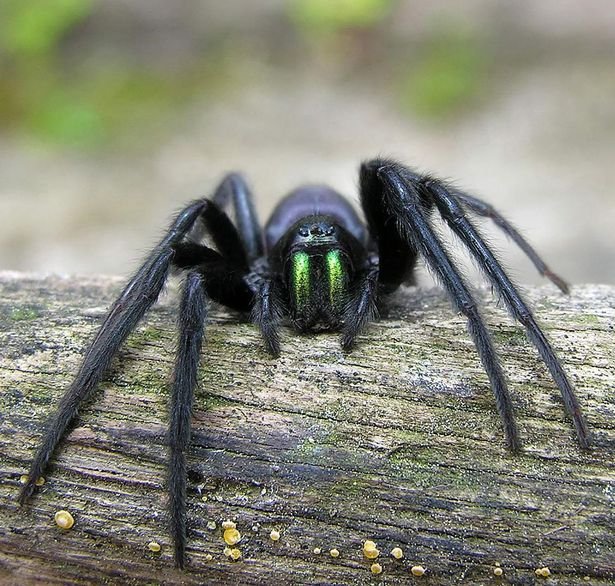
The spiders are set to invade British homes
She said "I was filming it but could not handle the pain and after about 20 seconds I nearly passed out. It developed into cellulitis.
"It was the tropical disease specialist at North Manchester General Hospital that suggested it could be a false widow."
Pest management consultant Clive Boase says conditions are ideal for a significant spike in numbers.
"We've had a reasonably warm year with very few cold snaps and that has led to more invertebrates, such as flies, to feed on.
"It meant false widows, as well as many other species of spiders, could continue their development
throughout the summer.
"Sightings of spiders often peak from September onwards as males of many species reach adulthood and venture into homes in search of a mate, and we could be seeing a lot more of them than normal over the next month or two.

Conditions are ripe for a huge rise in numbers
"The population of false widows in the UK is growing all the time. In fact, people don't realise just how common they have become.
"There are half-a-dozen different species of the false widow and they can survive both indoors and outdoors. They prefer suburban areas and are most commonly found around domestic and commercial premises.
"They love conservatories and toilet blocks, window frames, porches, lofts and garages and they like to live beneath kitchen appliances and cupboards.
"They are generally shy creatures and won't come out into the open, but they could crawl into curtains or perhaps clothing left on the floor.
"They certainly can give a painful bite, though there have been very few reports of that happening as they will only do so as a last resort.
"Bites usually result from handling the spider roughly or perhaps having it trapped between clothing and skin."
Rob Simpson, manager of pest controllers register Basis Prompt, says simple precautions can be taken to reduce the likelihood of false widows.
Keeping homes clean and tidy, sealing up cracks or holes in doors and windows and removing plants or debris from the outside of houses will help.
"Spiders will have fewer places to hide if you keep clutter to a minimum, so I would say keep your house tidy and vacuum regularly.
"You can spray dark corners of the home with pesticides and there's an old wives tale about placing conkers on window sills, but I'm not sure that works."
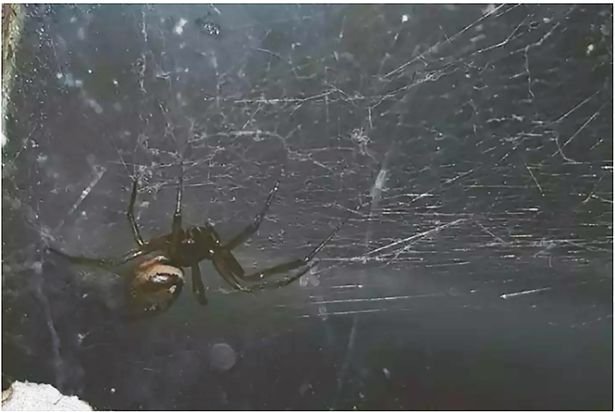
*The spider has woven a huge web in Janeane's home *
Homeowners or businesses keen to rid themselves of a spider infestation are being urged to seek professional advice.
In 2015 a man was hospitalised for ten days after his arm blew up and grew blisters when he had a severe reaction to a false widow bite.
Alex Beer, 32, put photos on Facebook after he was left in excruciating pain and injuries that resembled third degree burns.
His arm ballooned twice the normal size and was covered in blisters.
Shockingly the poisonous venom almost gave him kidney failure.
"At the hospital I was declining pretty fast to the point where my kidneys were starting to fail and large blisters were forming all over my arm" he said.
"I was sweating constantly and my arm had ballooned with the swelling travelling up my arm at an alarming rate and I felt extremely tired and was becoming less responsive."
Terrifyingly, he says he was bitten in his own home.
Health experts advise anyone bitten to cover it with a plaster and apply antihistamine cream.
The Natural History Museum say the species first established itself on the south coast, particularly in Dorset, Hampshire and Devon, but has significantly increased its foothold in the UK over the last 25 years, with sightings as far north as Scotland.
What arre false widow spiders
They are distinctive for their shiny, black flesh, bulbous bodies, thick legs and skull-like patterns.
They have long legs and can reach about 15mm in size.
Also known as steatoda nobilis, the spider is frequently confused for the black widow, which has deadly venom.
The false widow was first spotted in the UK in Torquay, Devon, in 1879, and it is understood that it may have made its way to these shores from Madeira or the Canary Islands in a shipment of bananas.
What should you do if you get bitten
The first thing you should do is wash the area thoroughly with soap and water to prevent infection - and don't scratch, as if you break the skin there's more chance for bacteria to get in.
Cover bites with a plaster and apply an antihistamine sting cream to calm any inflammation or itching, says Stuart Hine, from the Natural History Museum's identification and advisory service.
Any redness, pain or swelling should subside after three days.
Be alert to potential signs of infection, such as weeping blisters or painful swelling, that continue to
get worse after a few days.
If this happens, seek advice from your GP.
this publication scares me, but at the same time fascinates me, the spiders are so amazing and very scary.
Downvoting a post can decrease pending rewards and make it less visible. Common reasons:
Submit
hey nice article I'll support you @aquifi
Downvoting a post can decrease pending rewards and make it less visible. Common reasons:
Submit
Interdependence is and ought to be as much the ideal of man as self-sufficiency. Man is a social being.
- Mahatma Gandhi
Downvoting a post can decrease pending rewards and make it less visible. Common reasons:
Submit
They must have been trained by ISIS
Downvoting a post can decrease pending rewards and make it less visible. Common reasons:
Submit